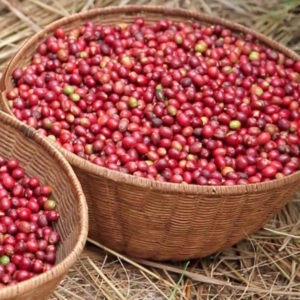Burundi is a country in which most farmers own just a few dozen coffees trees and carry their harvest — often a single bag — to market balanced on their heads or bicycles. It’s also a country in which an individual can create fantastic, community-impacting change, and that’s the case with all three of these microlot coffees from Burundi.
Social impact — with a strong focus on gender equality — is the driving force behind JNP Coffee, which was founded in 2012 by Burundi native Jeanine Niyonzima-Aroian. She’s a shareholder in a conglomerate of 20-plus washing stations, six of which support women through the purchase of their coffee cherries and later pay them premiums for excellent quality. She’s also a big supporter of the Burundi chapter of the International Women’s Coffee Alliance (IWCA)
“Last year, we paid $80,000 to the IWCA,” Jeanine told InterAmerican recently. “And when you see these farmers, they’re so happy! Everyone wants to be a part of the IWCA, including some of the men!”
Jeanine makes the point that in many cultures it’s common for a man to pocket a crop payment and spend it on himself, while the great majority of women invest such payment in their families.
“We say that it’s about empowering women, but if you want to be a part of it, you’re very welcome to join. Though when we give out the bonus, the wife has to come along to collect it. Because it’s not about exclusion, it’s about empowerment.”
We have small amounts left of three current-crop microlots from Burundi, two of which are from JNP. (Burundi has one crop a year, and the next crop is still at origin and not expected until early winter.) We’ve lowered the prices on all three coffees, to help them find great homes while they’re still absolutely delicious! The notes below are from re-cuppings in July 2018:
Burundi Gitwenge (P4832, P4826 33 bags NJ. In GrainPro)
Savory, tropical, citrus; bright acidity, silky body.
Burundi Butera (P4827 8 bags Houston. In GrainPro)
Grapefruit, hibiscus, chocolate, black tea; bright acidity, delicate body.
Another influential figure in Burundi coffee is Jean-Clement Birabereye, the owner of SEGEC and the Mpanga washing station. Jean-Clement oversaw the creation of the station in 2008 and, with a laser focus on quality, keeps it well-maintained and updated with equipment that today includes 450 drying beds, six-disc McKinnon pulping machines and two pressers.
As with JNP, the quality of SEGEC coffees have been recognized with Cup of Excellence awards. And also like JNP, SEGEC pays quality bonuses to the farmers who supply the station and supports community-building efforts. Recently, these included building a new coffee nursery and providing trainings for farmers.
Burundi Mpanga Benga (P4849 13 bags Annex. In GrainPro)
Cherry, papaya, nutty, floral; lively acidity, silky body.
Please contact your trader for details or email traders.iacus@nkg.coffee. We can’t wait to share these with you! •
—
All bags are 60kg. The lead photo is from the Benga mill in the Kayanza region.
